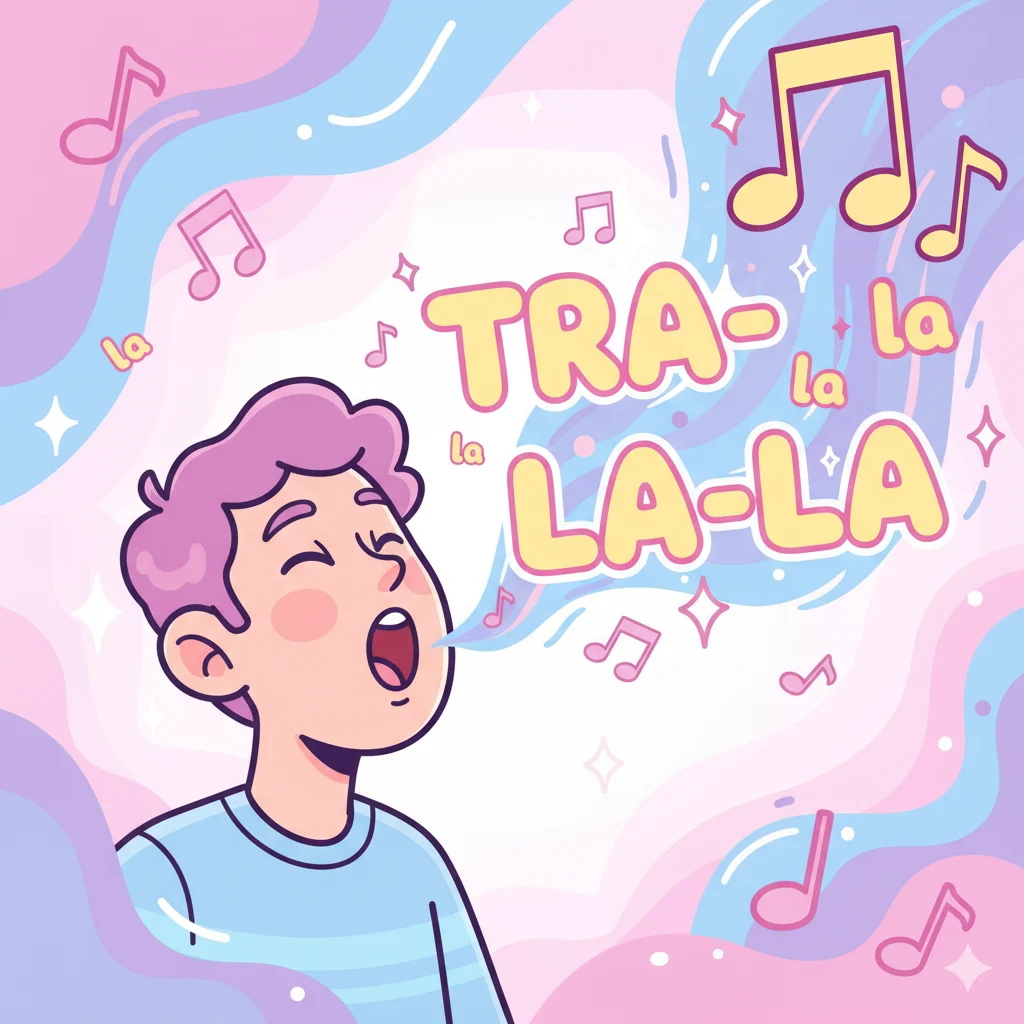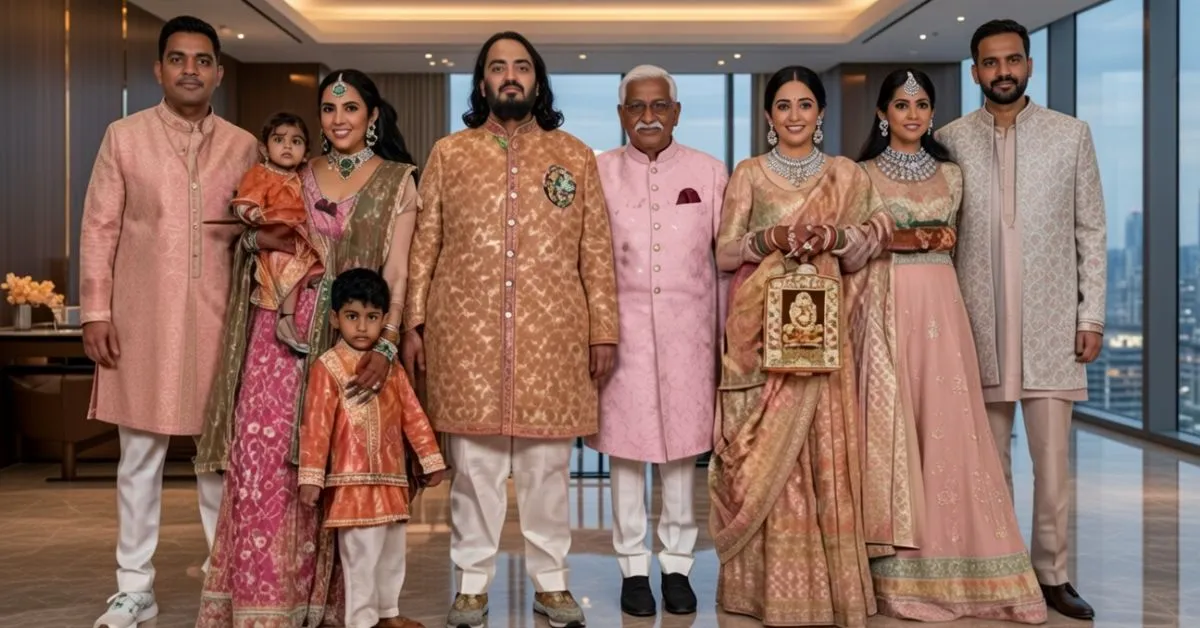“Tralala” or “Tralalero” is a playful, nonsensical sound used in many languages to represent singing, humming, carefree behavior, or avoiding a serious topic. In English, it doesn’t have a strict dictionary meaning — it’s more of a sound effect or expression that conveys joy, silliness, or ignoring something intentionally.
Thank you for reading this post, don't forget to subscribe!You’ll find “tralala” in songs, memes, jokes, nursery rhymes, and even sarcastic conversations. Depending on the tone, it can mean:
- “I’m singing casually.”
- “I’m carefree.”
- “I’m pretending not to hear you.”
- “I’m avoiding drama.”
In short, it’s a fun, light, musical filler expression rather than a word with a literal definition.
Meaning of “Tralala” in English
“Tralala” in English usually means singing without words, similar to humming or making childish, playful sounds.
People might say “tralala” when they:
- Imitate singing in a silly way
- Want to show they’re carefree
- Act like something doesn’t bother them
- Change the subject
- Pretend innocence
- Avoid an awkward or serious moment
Examples:
- “And I walked into the room tralala-ing because I didn’t want to answer questions.”
- “She sang tralala like it was a Disney movie.”
It’s basically the verbal version of 🎶 la la la 🎶.
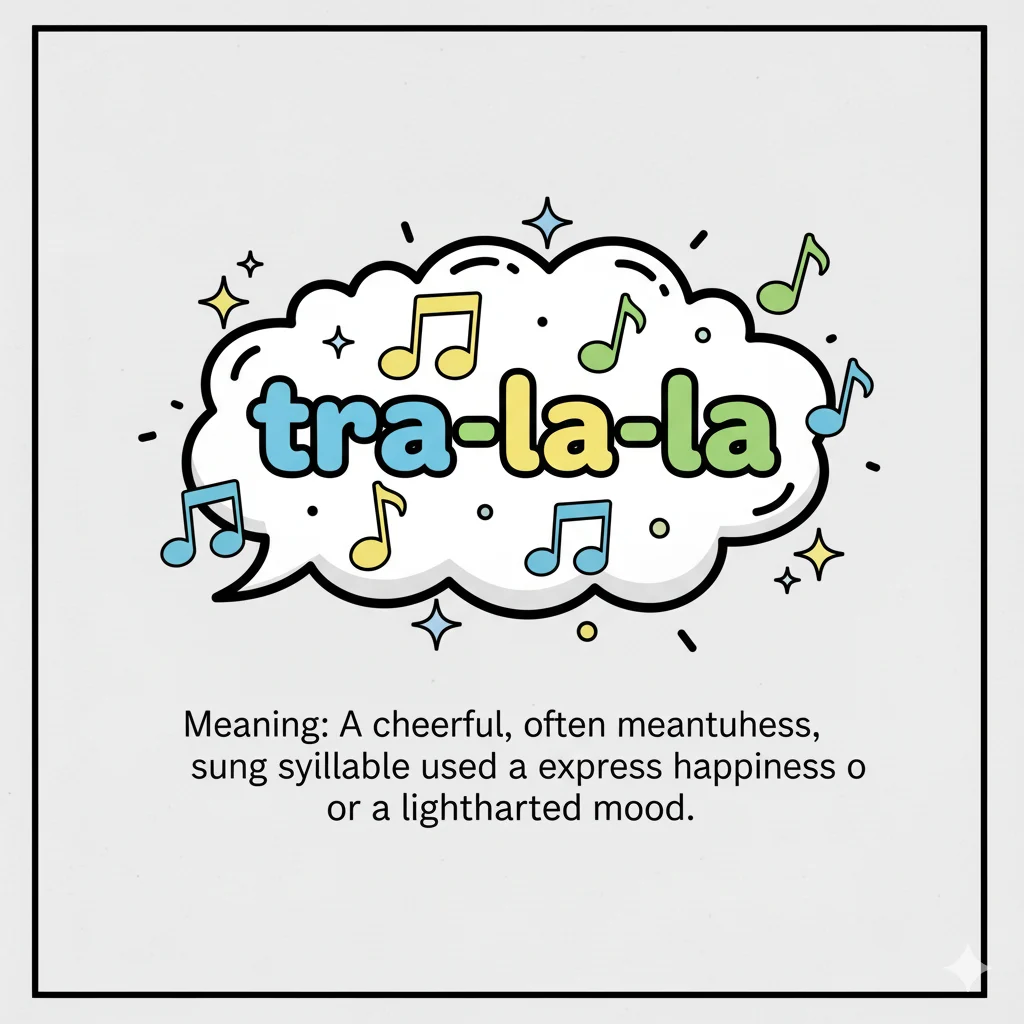
Meaning of “Tralalero”
“Tralalero” is a variation of “tralala,” usually appearing in European languages like Italian, French, and Spanish, and it carries the same playful vibe.
In English, “tralalero” still means:
- A silly song-like sound
- Carefree humming
- Musical nonsense syllables
Example:
“He danced around the house, tralalero, without a worry in the world.”
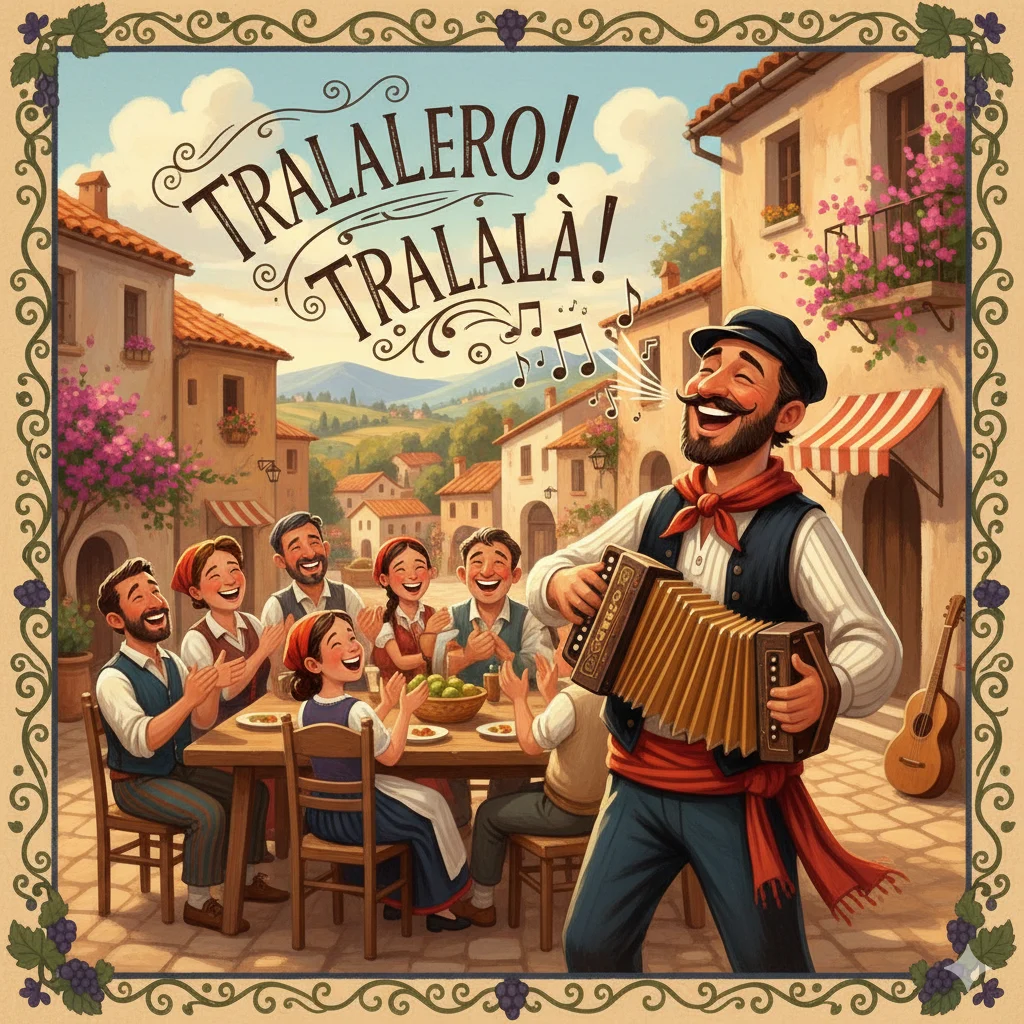
Literal Meaning vs. Slang Meaning
Literal
There is no direct English translation because it’s not a vocabulary word — it’s just a sound effect used to mimic singing.
Slang / Conversational Meaning
Means someone is being carefree, goofy, or pretending not to care.
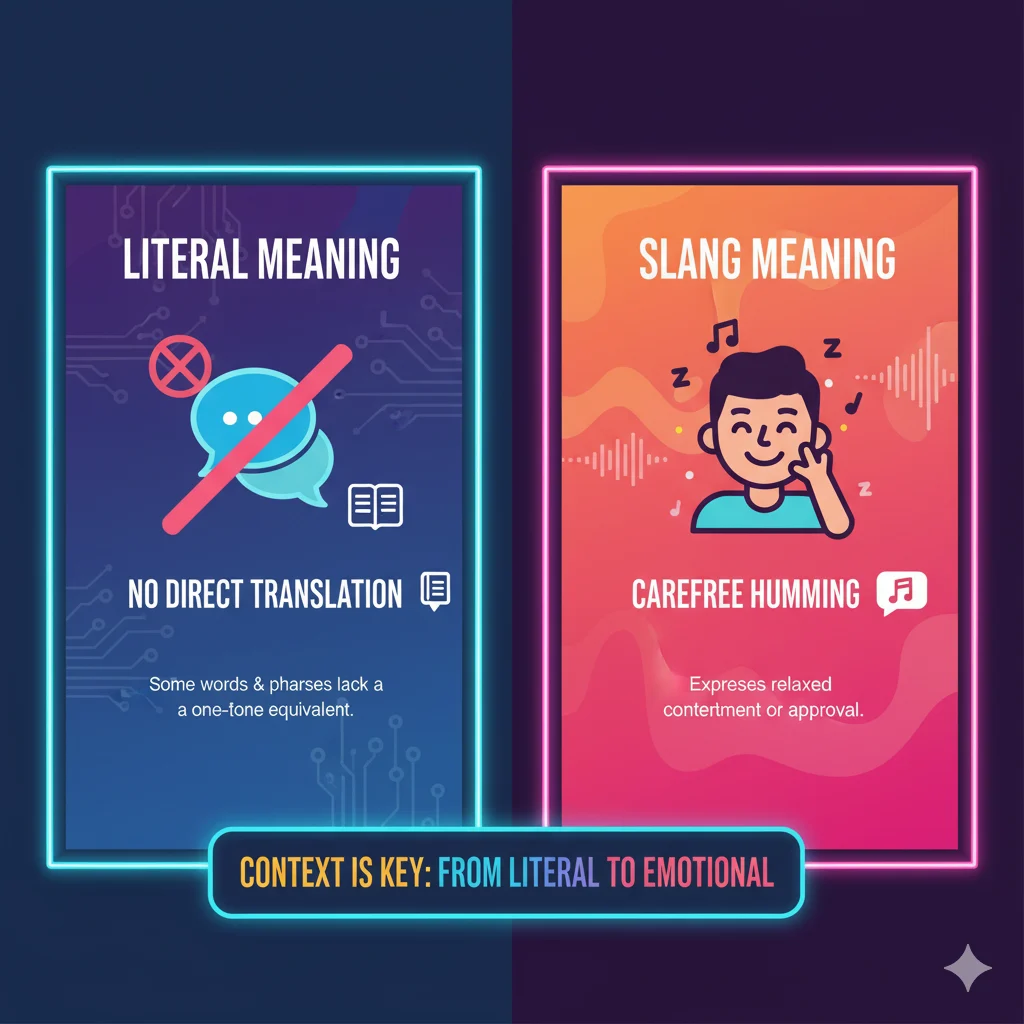
Where “Tralala” Is Commonly Used
In Music
Used as a filler sound when actual lyrics aren’t needed.
Example:
“Tra-la-la-la-la, la-la-la-la” from holiday songs.
In Cartoons
Characters use “tra-la-la” to show they’re happy or oblivious.
In Jokes
Said sarcastically when someone avoids responsibility.
Example:
“Oh, bills? Stress? Nope — tralala, not thinking about it.”
In Internet Memes
Used humorously to show carefree chaos.
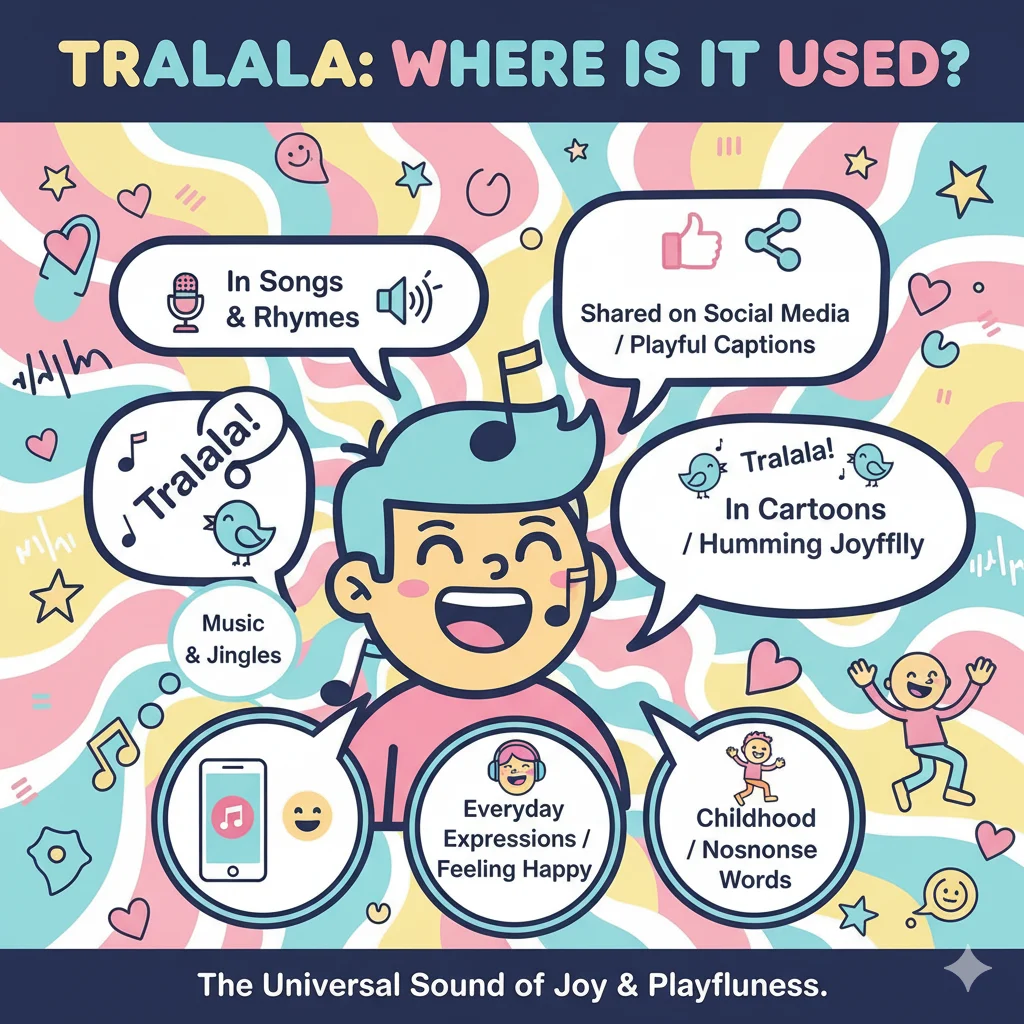
Cultural Roots and History of “Tralala”
While “tralala” is used globally, it appears in old European folk songs. The repetition of “la,” “tra,” “ra,” and “la” has always been used in vocal music for:
- Warmups
- Filler sounds
- Non-lyrical melodies
- Joyful tunes
Over time, it became associated with carefree emotions, which carried into English through music, cinema, and internet culture.
Different Meanings in Different Contexts
When Someone Is Happy
“Tralala” shows pure joy or excitement.
Example:
“She skipped down the street, tralala, with her ice cream.”
When Someone Is Ignoring Something
Used humorously to avoid tension.
Example:
“Deadline tomorrow? Tralala, I don’t see it.”
When Someone Is Being Playful
Often used in jokes, storytelling, or TikTok audios.
When Imitating Singing
Singers may vocalize with “tralala” during warmups.
When Pretending Innocence
A sarcastic way to act like you did nothing wrong.
Example:
“Me walking past the mess I created: tralalaaa…”
Variations of “Tralala” and Their Meanings
- Tra-la-la → Most common English style
- Tralalero → Longer, more musical variation
- La la la → Simple humming sound
- Trololololol → Viral meme version, originated from the “Trololo Song”
- Tralalaaa~ → Expressive, dramatic, joking version
- Tra-la-lee / Tra-la-loo → Used in children’s songs
All variations express carefree singing, goofy behavior, or avoiding something.
Is “Tralala” a Real Word?
Technically, no — it’s an onomatopoeic sound, meaning a sound written as a word.
Examples: “boom,” “haha,” “meow,” “lalala.”
So while it’s not a dictionary word with a definition, it is a real expression used worldwide.
“Tralala” in Modern Pop Culture
Movies
Characters often say “tra-la-la” during funny or musical scenes.
TikTok
Creators use “tralala” in comedic skits to show:
- Cluelessness
- Avoiding drama
- Being silly
- Carefree aesthetics
Memes
Used in reactions like:
“Me ignoring my responsibilities — tralala.”
When “Tralala” Is Used Sarcastically
Sometimes the tone flips from happy to ironic.
Meaning:
“I don’t care.”
“I’m ignoring this drama.”
“I’m pretending everything is fine.”
Example:
Friend: “Your ex is dating again.”
You: “Tralala, not my problem!”
How to Use “Tralala” in a Sentence (Examples)
Casual Usage
- “I walked around the house tralala like nothing happened.”
- “She cooked while humming tralalero.”
Playful
- “Singing tralala with my dog like it’s a music video.”
Sarcastic
- “Boss: Where’s the report? Me: Tralala, what report?”
Internet Style
- “My brain when I’m avoiding responsibilities: tralala 🎶”
Common Misunderstandings
Does “tralala” mean something rude?
No — it’s harmless, fun, and childlike.
Does it mean “idiot” or “fool”?
No. Some people compare it to acting silly, but it never means “fool.”
Does “tralalero” mean something in Spanish or Italian?
No direct meaning — it’s just a sound or playful music phrase.
Does it refer to a place or object?
No, it’s purely an expression.
“Tralala” in Different Languages (English Meaning Stays the Same)
- Spanish: “Tralará / Tralarí”
- French: “Tralala”
- Italian: “Trallallero / Tralalero”
- German: “Trallala”
In English translations, all mean:
➡️ musical nonsense sound
➡️ joyful singing
➡️ carefree mood
“Tralala” vs Similar Expressions (Comparison Table)
| Expression | Meaning | Mood | Usage |
|---|---|---|---|
| Tralala | Playful/happy humming or ignoring something | Cheerful or ironic | Conversation, memes, stories |
| La la la | Simple humming | Happy | Songs, warmups |
| Trolololo | Meme-style musical nonsense | Comedic | Memes, TikTok |
| Doo-doo-doo | Casual humming | Calm | Music, movies |
| Na-na-na | Singing without lyrics | Neutral | Pop songs |
| Dum-dee-dum | Carefree or clueless | Silly | Jokes, stories |
Why People Use “Tralala” Today
It’s fun and expressive
Adds personality to speech.
It’s universally understood
Everyone recognizes it as a singing sound.
It fits meme culture
Perfect for expressing chaos, avoidance, or silliness.
It works in storytelling
Lightens the mood and adds color.
When Not to Use “Tralala”
Avoid using it when:
- Talking about serious or emotional situations
- Writing formal emails
- Discussing important responsibilities
- Addressing someone who might misunderstand playful slang
Summary
“Tralala” or “Tralalero” is a non-meaning word used to express playful singing, carefree behavior, or intentionally ignoring something. It appears in songs, memes, jokes, and conversations as a fun, expressive, and sometimes sarcastic way to show happiness or pretend innocence.
In English, it simply represents joyful nonsense, humming, or a lighthearted mood — nothing rude, offensive, or deep.
It’s a happy, silly sound loved by storytellers, singers, kids, and the entire internet.

